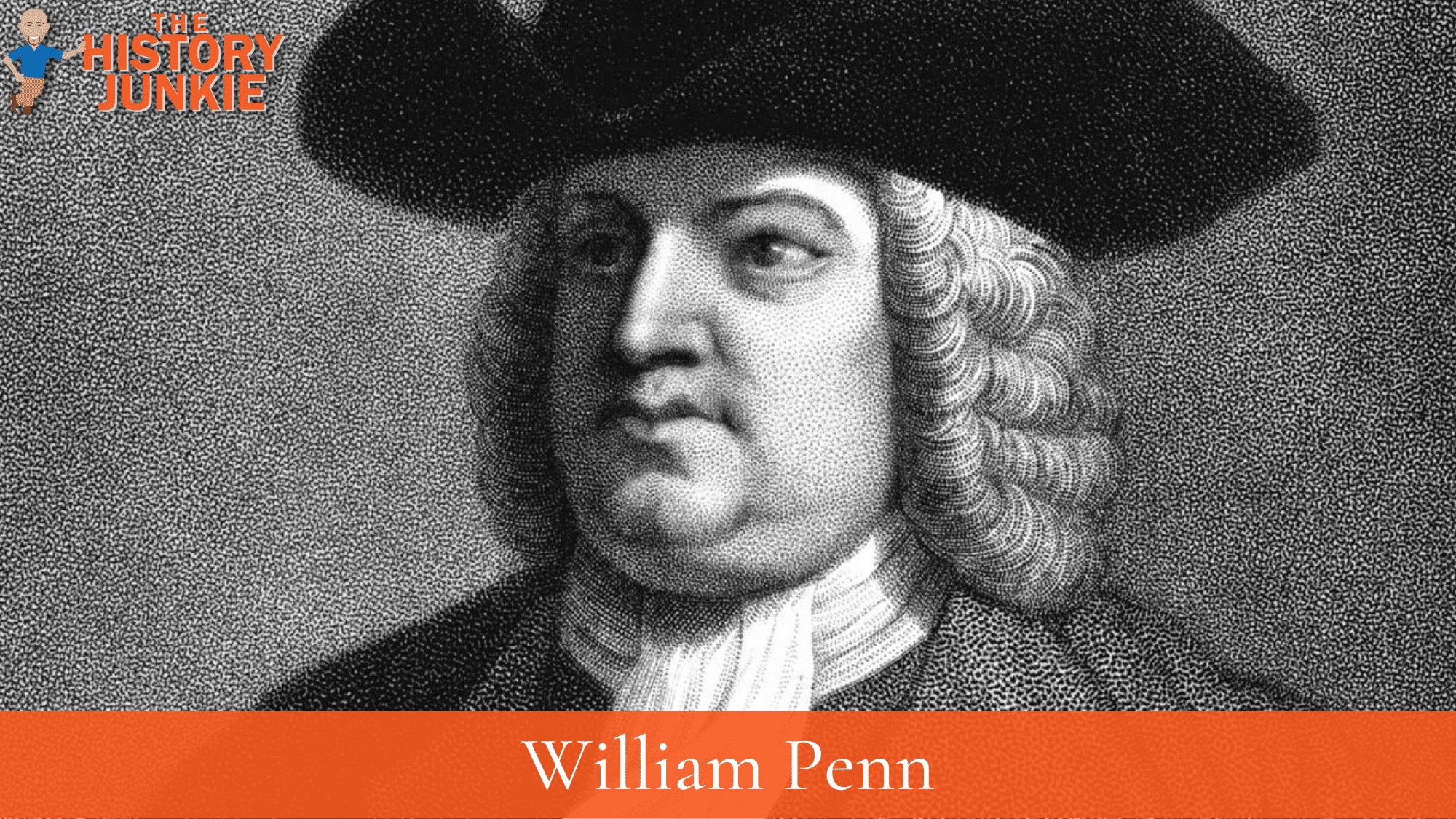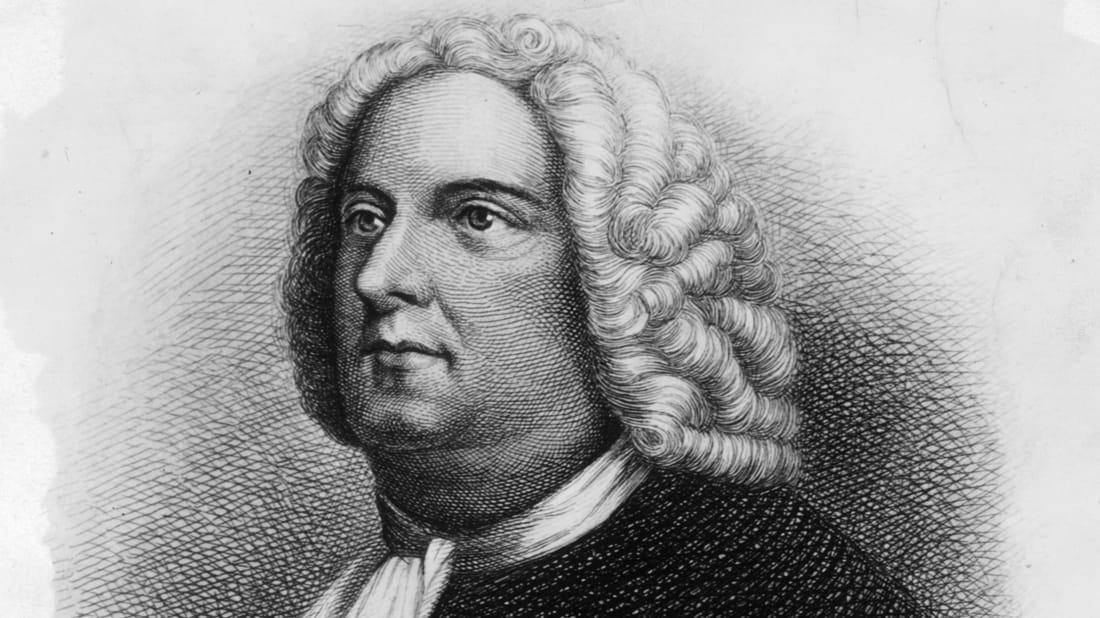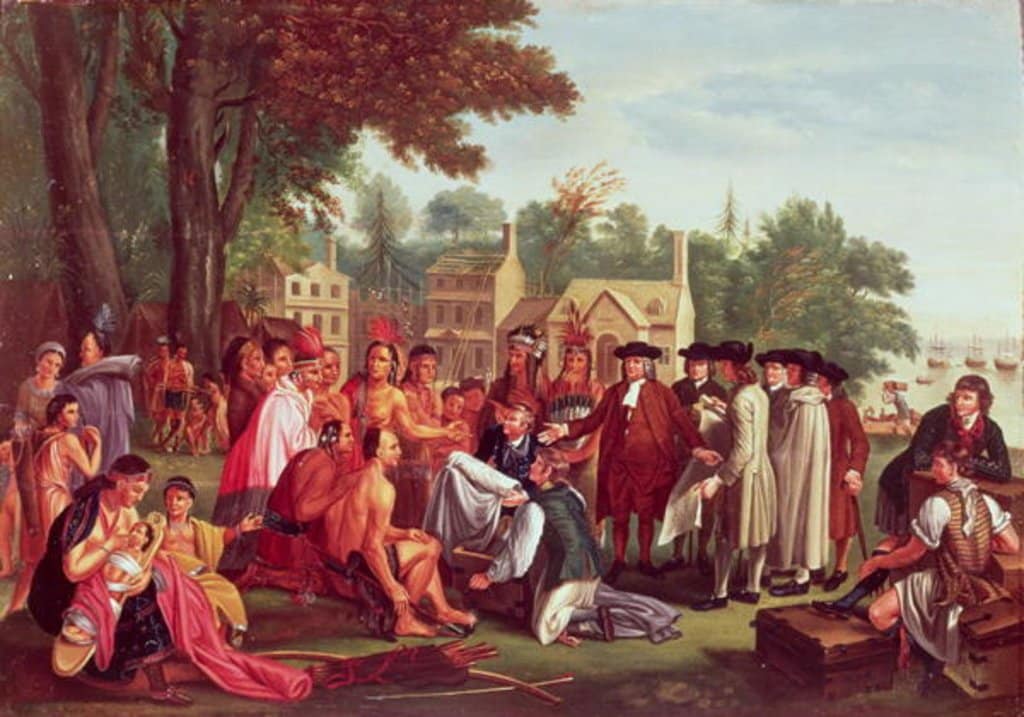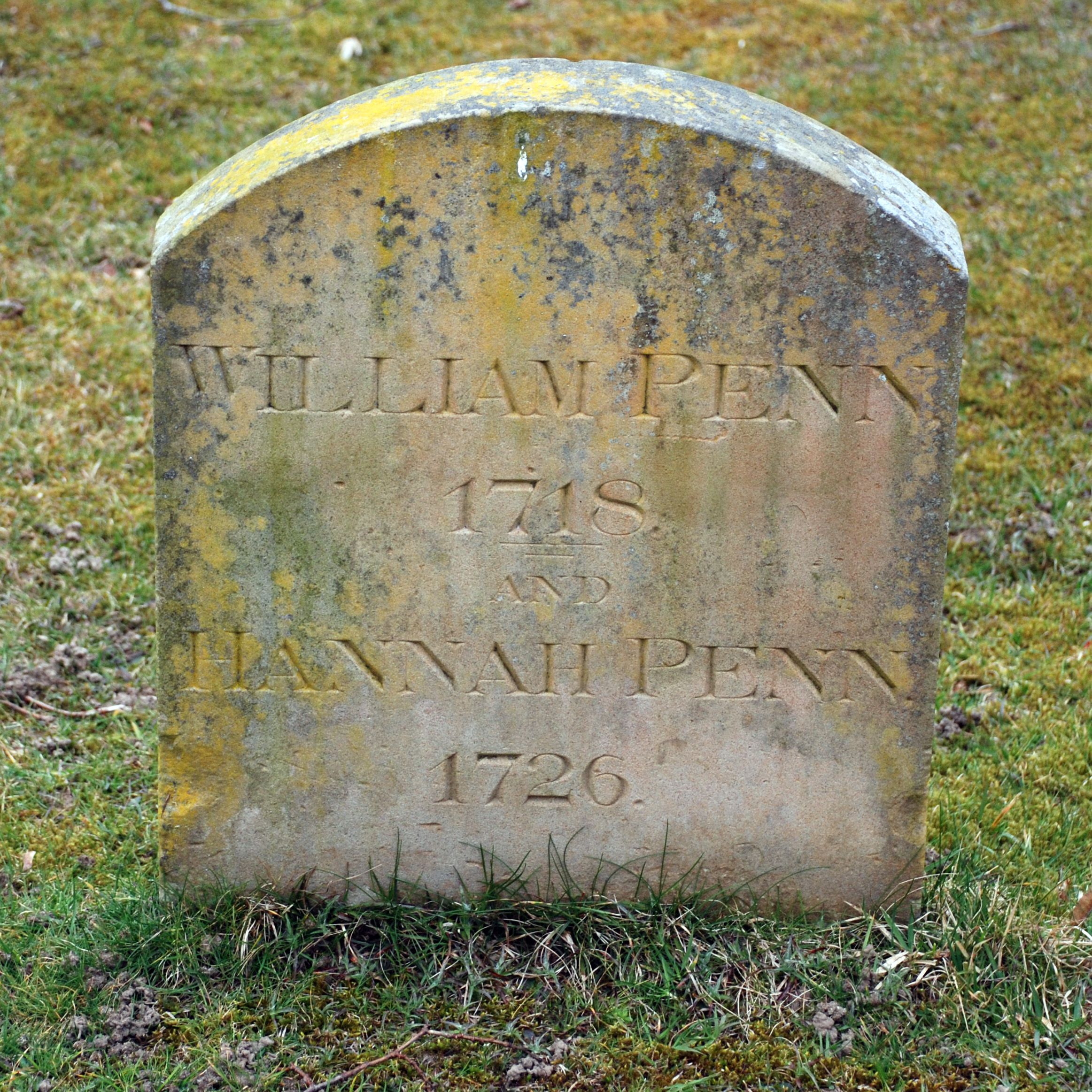William Penn is the father of Democracy in the United States, who Thomas Jefferson called

"the greatest lawgiver the world has produced."
He was a pacifist Quaker whose founding of the Christian government of Pennsylvania in 1682 inspired the later United States of America; his family kept ownership of it until the American Revolution.
Jump to:
William Penn was also one of the great champions of religious freedom in 17th century England, repeatedly imprisoned, who helped preserve the greatly persecuted Quaker religion that survives today.
Penn's new government originated the principles of representative government, separation of church and state, and elimination of nobility and ranks while producing almost exactly a century before the U.S. Constitution concepts such as an elected 2-house Congress to pass bills, religious freedom, freedom of speech, and a Bill of Rights.
He also, in 1693, drafted a lengthy proposal for a future European Union or, as he called it, a "European League, or Confederacy."
Biography

William Penn was born on October 14, 1644, the oldest son of famous Admiral Sir William Penn and Margaret Jasper's three children.
The Admiral was renowned for his naval victories for the Crown during its mid-seventeenth-century wars with the Dutch and was knighted by King Charles II for his service in the Royal Navy.
Margaret Jasper was the daughter of a wealthy Rotterdam merchant. Recovering from a recent civil war, England had few funds left with which to fight, and the Admiral had personally used his own wealth, approximately sixteen thousand pounds, to fund the Navy, an unsettled debt that would have later consequences.
England ultimately ended up controlling considerable land in America, the 'New World', as a result of its successful war against the Dutch.
Education
At age 11, Penn attended Chigwell Academy near Wanstead, England, and in 1656, the family moved to Ireland, where he received private tutoring.
At age 17, William Penn was expelled from Oxford University for criticizing the elaborate ceremonies of the Anglican Church, protesting required chapel attendance, and visiting a professor who'd been dismissed for teaching tolerant Humanism.
Following this, his parents sent him to France, enrolling him in its most respected Protestant University, l'Académie Protestante, where he studied with Christian Humanist Moïse Amyraut, a supporter of religious tolerance.
In August 1664, nearing his 20th birthday, Penn returned to England and studied at Lincoln's Inn, the most prestigious law school in London.
Penn's father, the Admiral, who was then assigned to rebuilding the Royal Navy in preparation for another war with the Dutch, asked that his son serve as his personal assistant aboard the Royal Charles and also used him as a courier for delivering messages to King Charles II, during which the young Penn developed a friendly relationship with the King and his brother James, the Duke of York. In 1666, following his first military victory, a young William Penn posed for a portrait in a suit of armor.

Spiritual Journey into the Quakers
The Quakers were founded in 1647 by George Fox and believed all people were equal before God, emphasizing a direct relationship with their Creator. They believed they were guided by an "inner light", the Holy Spirit, opposed restriction of individual conscience, and had simple, unadorned church services without ministers, sacraments, or liturgy.
Quakers furthermore refused to swear oaths of loyalty to the King, pay tithes to the Anglican Church, or bear arms. In Anglican England, they were viewed as heretics and subject to arrest, persecution, and imprisonment.
In 1667, William Penn was introduced to Quaker missionary Thomas Loe and underwent an experience similar to the Apostle Paul, claiming, "The Lord visited me, and gave me divine Impressions of Himself."
He afterward began attending Quaker meetings, known as The Society of Friends, even though this was a crime in Anglican England at the time.
In September 1667, police broke into a meeting, arresting everyone, but released William because he looked like an aristocrat rather than one of the plain-clothed Quakers.
Penn refused to be released and had himself jailed, insisting that he be treated the same as his new friends.
He then began preparing a legal defense and began writing about freedom of conscience. His father then disowned him when he refused to disaffiliate himself from the Quakers, and he lived in a number of Quaker households when not imprisoned.
This new affiliation shocked the high society to which Penn belonged because the Quakers at the time were an intensely persecuted faction, yet he nevertheless maintained standing in the king's court because the Duke of York trusted him.
Marriage and Children
In 1668, staying with the Quaker family of Isaac Penington of Buckinghamshire, Penn was introduced to Penington's step-daughter, Gulielma Maria Springett, and it was virtually love at first sight. They were wed on April 4, 1672, and she would bear 8 children, only 3 of whom lived to adulthood: Springer, Laetitia, and William.
Gulielma died on February 24, 1664. On March 5, 1696, William Penn was married once more to Hannah Callowhill, who would bear 6 children.
Imprisonment
Penn's attack on the Anglican Church's doctrine of the Trinity led to 7-month imprisonment in the famed Tower of London from 1668-1669 by an Anglican bishop. Rather than recant, Penn declared from his cell,
My prison shall be my grave before I will budge a jot; for I owe my conscience to no mortal man
During this time, Penn wrote several pamphlets on Quakerism, including the famous No Cross No Crown on religious tolerance in 1669.
Penn ultimately was imprisoned six times, and during those imprisonments also penned in 1670 The Great Case of Liberty of Conscience, arguing for the separation of church and state.
However, Penn's numerous writings could not stop the persecution of the Quakers, and he began to dream of a solution to the "Quaker problem," a new colony where Quakers and others could live freely together in a "Holy Experiment."
Trial
To stop the growing power of Catholicism, England's Parliament passed the Conventicle Act, punishing religious dissent as sedition. Nevertheless, the law was used mainly against Quakers due to their lack of political connections, and thousands were imprisoned, with England seizing their properties, including that of Penn's wife's family.
The newly released William Penn, rather than backing down, promptly challenged the new Conventicle Act by holding a public Quaker meeting on August 14, 1670.
The Lord Mayor of London had him and his fellow Quakers arrested immediately.
At the famous trial, Penn claimed that since the government refused to present a formal indictment, the jury could not reach a guilty verdict. He would go on to say:
If these ancient and fundamental laws, which relate to liberty and property, and which are not limited to particular persuasions in matters of religion, must not be indispensably maintained and observed, who then can say that he has a right to the coat on his back? Certainly our liberties are to be openly invaded, our wives to be ravished, our children slaved, our families ruined, and our estates led away in triumph by every sturdy beggar and malicious informer--as their trophies but our forfeits for conscience's sake.
The jury acquitted all defendants, but the furious Lord Mayor fined the entire Jury and threw them in Newgate Prison.
Still, the Jury refused to change their verdict, and after 2 months, were released through a writ of habeas corpus by the Court of Common Pleas, following which the Jury then sued the Lord Mayor of London on the grounds of false arrest.
This led to the famous ruling by the Lord Chief Justice of London with his 11 associates that juries must not be punished or coerced for their verdicts, which would prove historically key in protecting the right to trial by jury for later generations.
Founding of Pennsylvania
Due to intense religious persecution of Penn's Quakers in England, Penn and other prominent Quakers prepared for emigration to America, purchasing West Jersey in 1677 and later East Jersey in 1682.
Penn, in May 1680, petitioned King Charles II for land between Lord Baltimore's province of Maryland and the province of York belonging to the Duke of York. Penn agreed to forgive the Crown its £16,000 debt due to the Penn family in exchange for land on which to build a colony for England's persecuted minorities.
On March 4, 1681, King Charles II granted a generous charter to Penn, which was officially proclaimed on April 2, making him the sole proprietor in addition to the Jersey territory they had purchased.
In 1682, the Duke of York, later King James II of England, also gave Penn Delaware a total of more than 16 million acres.
While Penn wanted the new territory named "New Wales" or "Silvania," King Charles II insisted that it be called Pennsylvania in honor of Penn's father, the Admiral.
In 1682, another royal grant included what later became the colony of Delaware.
Early Years of the Colony
Penn promoted successful Quaker colonization in New Jersey, for which he designed the famous "Concession and Agreements," his earliest governmental program.
By the charter for Pennsylvania, Penn was made the proprietary ruler of the province. He was the supreme governor with the power of making laws with the advice of the freemen, of appointing officers, and of granting pardons.
The laws were to contain nothing contrary to English law; appeals were possible to the Crown and the Privy Council. Parliament was to be supreme in all questions of trade and commerce; the right to levy taxes and customs was reserved to England, and an agent to represent Penn was to reside in London.
In case of neglect on the part of Penn, the Crown could reclaim the colony.
Penn called Pennsylvania a "Holy Experiment." His four "Frames of Government" of 1682, 1683, 1696, and 1701, and his Native American policy, charted the course of Pennsylvania's colonial history and had a long-term impact on several state constitutions.
He went to Pennsylvania in 1682-1684 as he founded and planned the city of Philadelphia and visited the colony again from 1699 to 1701. Meanwhile, he devoted most of his attention to writings and missionary work in England to promote Quakerism.
Penn's advertising campaign to promote his new colony was the most successful effort in colonial recruitment since the Puritans founded Massachusetts in the 1630s. During 1682-83, he recruited 50 shiploads of passengers. This success provided the momentum to launch the Quaker colony.
Penn and his agents used numerous techniques and appeals to attract settlers to Pennsylvania. Normally, he was able to recruit from districts in England and Ireland where Quakerism was strong or where he had personally spent much time and was well-known. His efforts to attract religious minorities in Germany proved especially successful.
Despite his ability to attract settlers and sell a fairly large amount of real estate, he made little profit from the venture and, for a time, languished in a debtors' prison. The selling of Pennsylvania was a grand financial success for all - except for Penn himself.
Penn's failure to govern Pennsylvania effectively can be traced to his absence from the colony during 1684-99, his constant tampering with the mechanisms of governance, and his insufficient respect for his subjects.
The hierarchical model of government he supported was liberal for the day but still provided the Quaker settlers with less power than they wanted.
Relationship with the Native Americans

Penn's government, unusually, is renowned for its cordial relations with Native Americans. Even though Penn was granted his territory by King Charles II, he refused to grant or settle it without first buying it from the Native Americans who lived there, insisting on purchasing it through "peaceful, voluntary exchanges," and even learned Indian dialects himself so that he could conduct negotiations without interpreters.
By 1668, he had purchased all but the northwestern third of Pennsylvania, and in 1684 and 1689 additionally purchased the Iroquois Confederacy's claims to the rest of the land, as well as claims from the Delawares and Wyandots in 1685.
Penn maintained peaceful relations with the Native Americans and was well-respected by the Susquehannocks, Shawnees, and Leni-Lenape for his courage because he would walk among them without guards or weapons and was an incredible sprinter who could outrun Indian braves.
Penn also recognized the citizenship rights of Swedish, Dutch, and Finnish settlers living in the newly acquired Delaware River Valley.
Equal Treatment for Most
Well ahead of his time, William Penn not only interacted peacefully with Native American tribes but insisted on equal rights for women. While Penn nevertheless owned slaves, as did other early Quakers, Pennsylvania banned the importation of slaves in 1696.
In 1758, before the U.S.A. was even born, Quakers formally opposed slavery altogether and would form much of the early opposition to slavery in the coming United States of America, founding the first American anti-slavery group and inspiring early abolitionism.
While ahead of its time in guaranteeing freedom of religion to all Christians - thus attracting numerous Mennonites, Amish, Anabaptists, German Lutherans, Calvinists, Moravians, Scots-Irish Presbyterians, Welsh Baptists, Irish Catholics, and Missionary Anglicans, the government did not guarantee true freedom of religion as we think of it today.
Atheists were excluded, while Jews and other non-Christians could not hold office or vote.
Setting up the Government of Pennsylvania
The new government of Pennsylvania, established in 1682, was a religious utopia to which all the persecuted religious minorities of Europe fled and were granted safe haven.
The government consisted of a Governor and freemen of the province, the latter as represented by two ruling houses, a 72-member Provincial Council and a General Assembly (200-500 representatives), both selected through free and voluntary public elections.
The Provincial Council was presided over by the Governor and responsible for proposing bills to become Law, with sweeping power to split into 6-18 member subcommittees governing the execution of the laws.
Laws proposed by the Provincial Council would pass to the General Assembly for passage. Both houses required ⅔ approval for passage. All public officials were required to "such as possess faith in Jesus Christ."
Trials were by 12-member juries with witnesses commanded to speak "the truth, the whole truth, and nothing but the truth."
Any people wrongfully imprisoned were to have double damages against the informer or prosecutor, and any found guilty of willful falsehood was to undergo the penalties of those against whom they bore false witness, "make satisfaction" for those they falsely testified against (presumably monetary) and be publicly exposed as false witnesses not credible for future court hearings.
Prisons were "work-houses" for felons and vagrants and free in fees, food, and lodging. All fees were to be moderate; both extortion and slander were serious offenses.
Key features included:
- The public education system requires all children at age 12 to be taught a useful trade or skill.
- Term limits: officials couldn't keep serving consecutive years due to 3 and 7-year limits and couldn't hold more than one public office.
- Fair taxation declaring no taxes could be enforced on citizens apart from passed law.
- Employee protections against overwork, reimbursement for defrauded employers, and registry of employment information, including names, times, wages, and days of employment.
- Government accountability: any officials found guilty of fraud were to pay double damages and be dismissed from their offices.
Christian Foundation
The Preamble's beginning was unapologetically Christian in tone, plainly revealing its foundation of the government to be based on Biblical principles. The final word in the Preamble, apart from Penn's name, is "Amen". The following are the 1st three paragraphs of the Preamble:
When the great and wise God had made the world, of all his creatures it pleased him to choose man his deputy to rule it; and to fit him for so great a charge and trust, he did not only qualify him with skill and power but with integrity to use them justly. This native goodness was equally his honor and his happiness; and whilst he stood here, all went well; there was no need of coercive or compulsive means, the precept of divine love and truth, in his bosom, was the guide and keeper of his innocency. But lust prevailing against duty made a lamentable breach upon it; and the law, that before had no power over him, took place upon him, and his disobedient posterity, that such as would not live comformable to the holy law within should fall under the reproof and correction of the just law without in a judicial administration.
This the Apostle teaches in divers of his epistles: "The law," says he, "was added because of transgressions." In another place, "Knowing that the law was not made for the righteous man; but for the disobedient and ungodly, for sinners, for unholy and profane, for murderers, for whoremongers, for them that defile themselves with mankind, and for manstealers, for liars, for perjured persons," etc.; but this is not all, he opens and carries the matter of government a little further: "Let every soul be subject to the higher powers; for there is no power but of God. The powers that be are ordained of God: whosoever therefore resisteth the power, resisteth the ordinance of God. For rulers are not a terror to good works, but to evil: wilt thou then not be afraid of the power? Do that which is good, and thou shalt have praise of the same." "He is the minister of God to thee for good." "Wherefore ye must needs be subject, not only for wrath, but for conscience' sake.
This settles the divine right of government beyond exception, and that for two ends: first, to terrify evil doers: secondly, to cherish those that do well; which gives government a life beyond corruption, and makes it as durable in the world, as good men shall be. So that government seems to me a part of religion itself, a filing sacred in its institution and end. For, if it does not directly remove the cause, it crushes the effects of evil, and is as such, (though a lower, yet) an emanation of the same Divine Power, that is both author and object of pure religion; the difference lying here, that the one is more free and mental, the other more corporal and compulsive in its operations: but that is only to evil doers; government itself being otherwise as capable of kindness, goodness and charity, as a more private society. They weakly err, that think there is no other use of government, than correction, which is the coarsest part of it: daily experience tells us, that the care and regulation of many other affairs, more soft, and daily necessary, make up much of the greatest part of government; and which must have followed the peopling of the world, had Adam never fell, and will continue among men, on earth, under the highest attainments they may arrive at, by the coming of the blessed Second Adam, the Lord from heaven. Thus much of government in general, as to its rise and end."
Long before the Bill of Rights, there was Penn's Charter of Privileges passed on October 28, 1701. All citizens were guaranteed rights under a "Charter of Privileges" including:
- Freedom of Religion. According to the first guaranteed privilege:
BECAUSE no People can be truly happy, though under the greatest Enjoyment of Civil Liberties, if abridged of the Freedom of their Consciences, as to their Religious Profession and Worship: And Almighty God being the only Lord of Conscience, Father of Lights and Spirits; and the Author as well as Object of all divine Knowledge, Faith and Worship, who only doth enlighten the Minds, and persuade and convince the Understandings of People, I do hereby grant and declare, That no Person or Persons, inhabiting in this Province or Territories, who shall confess and acknowledge One almighty God, the Creator, Upholder and Ruler of the World; and profess him or themselves obliged to live quietly under the Civil Government, shall be in any Case molested or prejudiced, in his or their Person or Estate, because of his or their conscientious Persuasion or Practice, nor be compelled to frequent or maintain any religious Worship, Place or Ministry, contrary to his or their Mind, or to do or suffer any other Act or Thing, contrary to their religious Persuasion. AND that all Persons who also profess to believe in Jesus Christ, the Savior of the World, shall be capable (notwithstanding their other Persuasions and Practices in Point of Conscience and Religion) to serve this Government in any Capacity, both legislatively and executively, he or they solemnly promising, when lawfully required, Allegiance to the King as Sovereign, and Fidelity to the Proprietary and Governor, and taking the Attests as now established by the Law made at New-Castle, in the Year One Thousand and Seven Hundred, entitled, an Act directing the Attests of several Officers and Ministers, as now amended and confirmed this present Assembly.
- Right to Property. According to the sixth and eighth guaranteed privileges:
THAT no Person or Persons shall or may, at any Time hereafter, be obliged to answer any Complaint, Matter or Thing whatsoever, relating to Property, before the Governor and Council, or in any other Place, but in ordinary Course of Justice, unless Appeals thereunto shall be hereafter by Law appointed.
IF any person, through Temptation or Melancholy, shall destroy himself; his Estate, real and personal, shall notwithstanding descend to his Wife and Children, or Relations, as if he had died a natural Death; and if any Person shall be destroyed or killed by Casualty or Accident, there shall be no Forfeiture to the Governor by reason thereof.
- Right to Fair Trial. According to the fifth guaranteed privilege:
THAT all Criminals shall have the same Privileges of Witnesses and Council as their Prosecutors.
Last Years and Death
A friend of King James II, William Penn, was on the losing side of the "Glorious Revolution" of 1688 and lost control of his province in 1692; it was restored to him in 1694.
His wife died in 1694, and he remarried in 1696. His fourth "Frame of Government" of 1701 was notable for its liberalism, being the constitution of colonial Pennsylvania.
His last years were filled with financial misfortune and included a term in debtors' prison in England.
William Penn died on July 30, 1718, in Ruscombe, Berkshire, England, following a series of strokes.
He is buried in a simple grave with no epitaph, but history has not forgotten his accomplishments in Colonial America.

